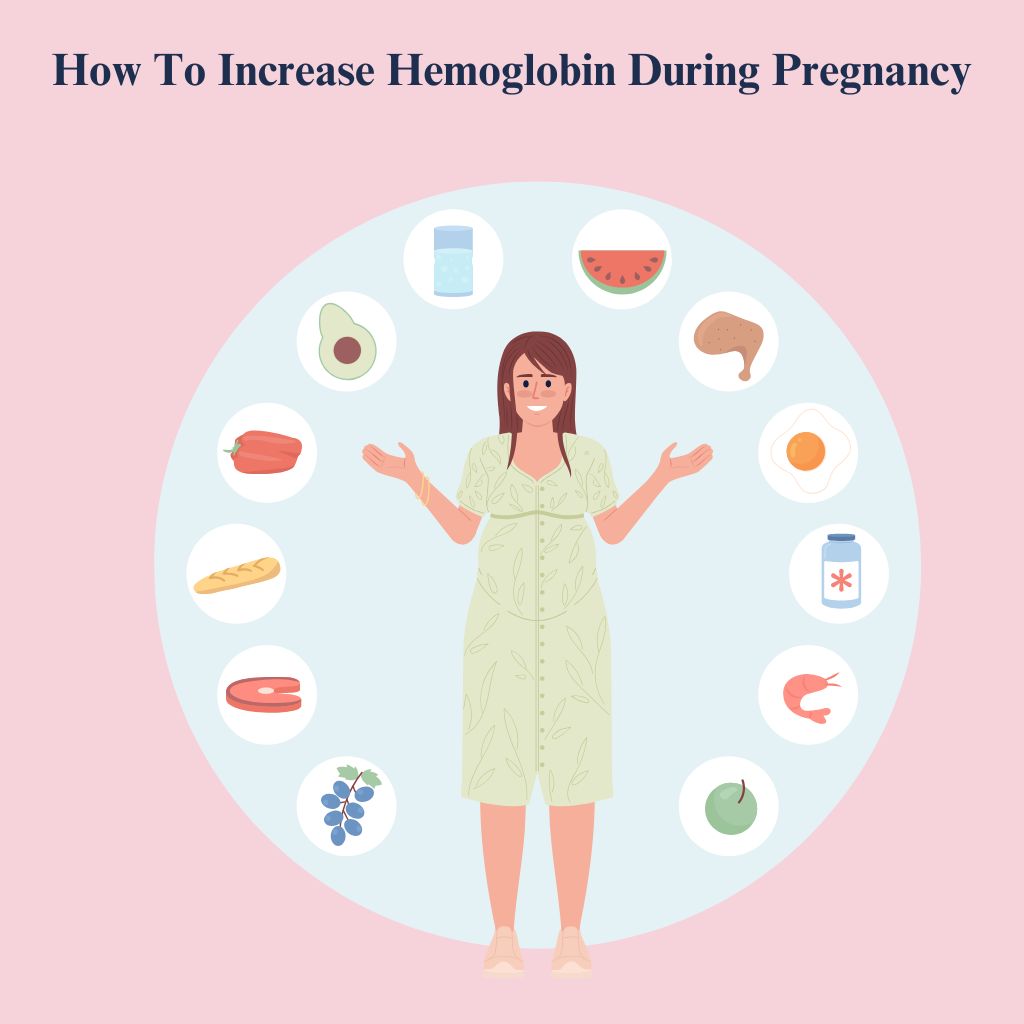Introduction
Pregnancy is a time when the body goes through major changes to support the growing baby. One of the most important factors for a healthy pregnancy is hemoglobin levels in pregnancy. Hemoglobin is a protein found in red blood cells that carries oxygen throughout the body. During pregnancy, it plays a crucial role in delivering oxygen to both the mother and the baby.
Doctors often check normal hemoglobin levels in pregnancy because low levels can lead to complications. According to the World Health Organization (WHO), hemoglobin levels below 11 g/dL in the first and third trimesters and 10.5 g/dL in the second trimester are considered low. The Centers for Disease Control and Prevention (CDC) also sets similar guidelines for monitoring hemoglobin levels.
Many pregnant women experience a drop in hemoglobin due to increased blood volume, nutritional deficiencies, or medical conditions like anemia. This can lead to symptoms such as fatigue, dizziness, and shortness of breath. Understanding what should be hemoglobin level during pregnancy and ways to maintain it is essential for both maternal and fetal health.
In this guide, we will explore how to increase hemoglobin during pregnancy using safe and effective methods, including diet, supplements, and lifestyle changes.
What is Hemoglobin?
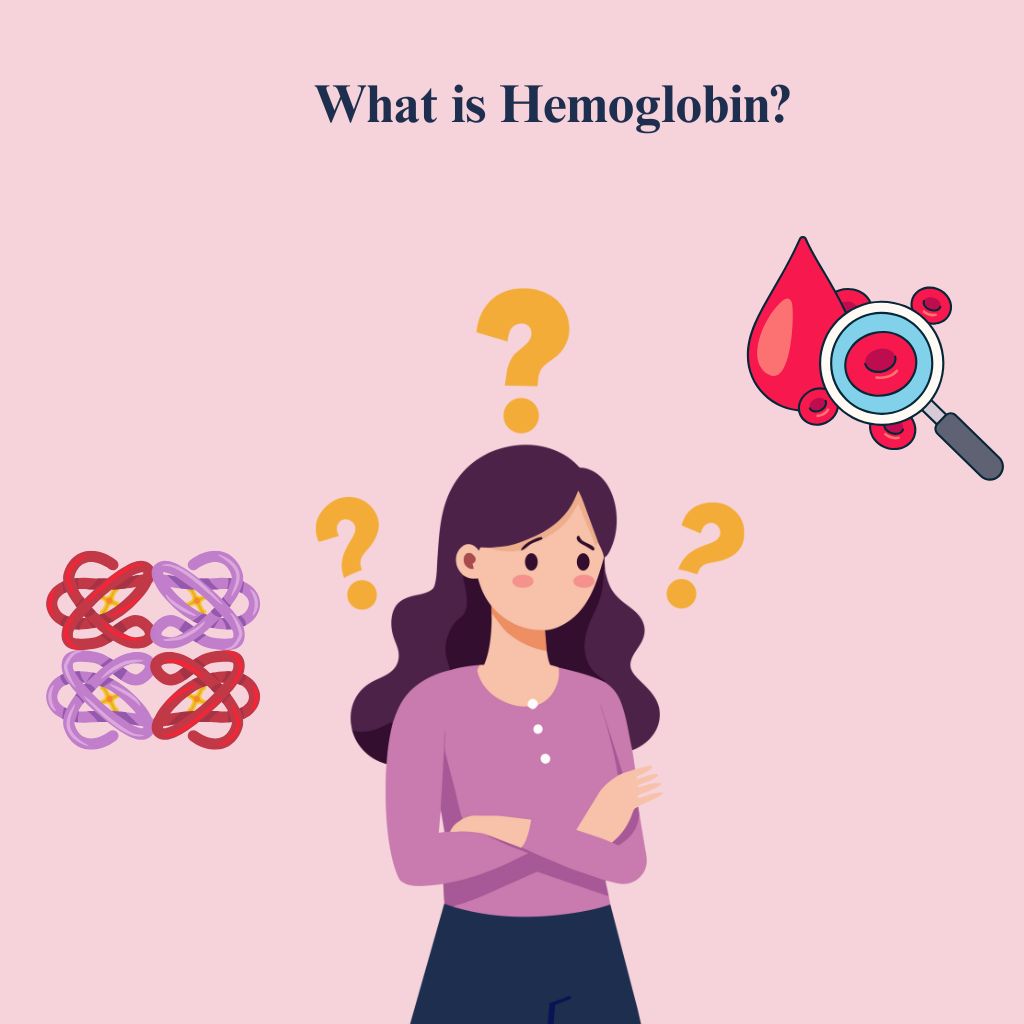
Hemoglobin is a protein found in red blood cells that plays a vital role in transporting oxygen from the lungs to different parts of the body. It also carries carbon dioxide back to the lungs for exhalation. This process ensures that organs and tissues receive the oxygen they need to function properly.
In pregnant women, hemoglobin becomes even more important as it supplies oxygen not just to the mother but also to the growing baby. Low levels of hemoglobin can lead to fatigue, dizziness, and other health concerns, making it essential to maintain healthy levels throughout pregnancy.
Causes of Low Hemoglobin During Pregnancy
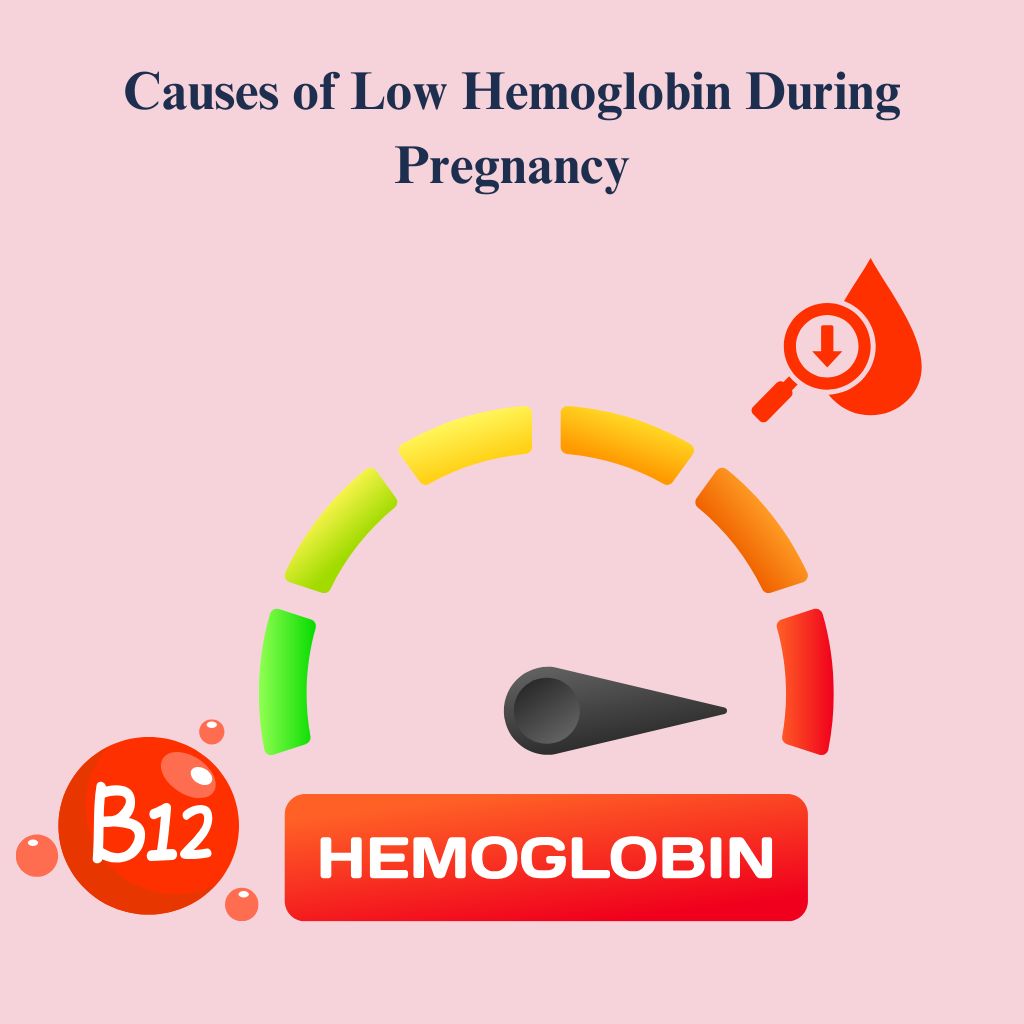
During pregnancy, the body undergoes various changes to support the growing baby. One of these changes includes an increase in blood volume, which can sometimes cause hb in pregnant woman to drop. When hemoglobin levels fall too low, the body struggles to transport oxygen efficiently, leading to fatigue and other health concerns.
Why Does Hemoglobin Drop During Pregnancy?
The primary reason for a decline in hemoglobin is the natural increase in blood plasma. While this is essential for circulation, it can dilute the concentration of red blood cells, making hemoglobin levels appear lower than usual.
Other common causes include:
- Iron deficiency: The body requires more iron to produce additional red blood cells, and a lack of iron can lead to anemia.
- Poor diet: Not consuming enough iron-rich foods can result in insufficient hemoglobin production.
- Folate deficiency: Folate helps in red blood cell formation, and a deficiency can contribute to anemia.
- Medical conditions: Some women may have underlying health conditions such as thalassemia, which affects red blood cell production.
Symptoms of Low Hemoglobin in Pregnancy
Many women may not immediately notice a drop in hemoglobin levels. However, certain symptoms of low hemoglobin in pregnancy can indicate an issue:
- Fatigue and weakness
- Dizziness or lightheadedness
- Pale skin and brittle nails
- Shortness of breath
- Cold hands and feet
Medical Conditions That Contribute to Anemia
Apart from dietary deficiencies, some medical conditions can further decrease hemoglobin levels, including:
- Iron-deficiency anemia: A condition caused by insufficient iron, leading to reduced red blood cell production.
- Folate deficiency: A lack of folate can result in poor oxygen transport.
- Thalassemia: A genetic condition that affects the ability to produce healthy hemoglobin.
Addressing these causes early can help how to raise hemoglobin count and maintain a healthy pregnancy. The next section will explore effective ways to improve hemoglobin levels naturally.
How to Increase Hemoglobin Naturally During Pregnancy
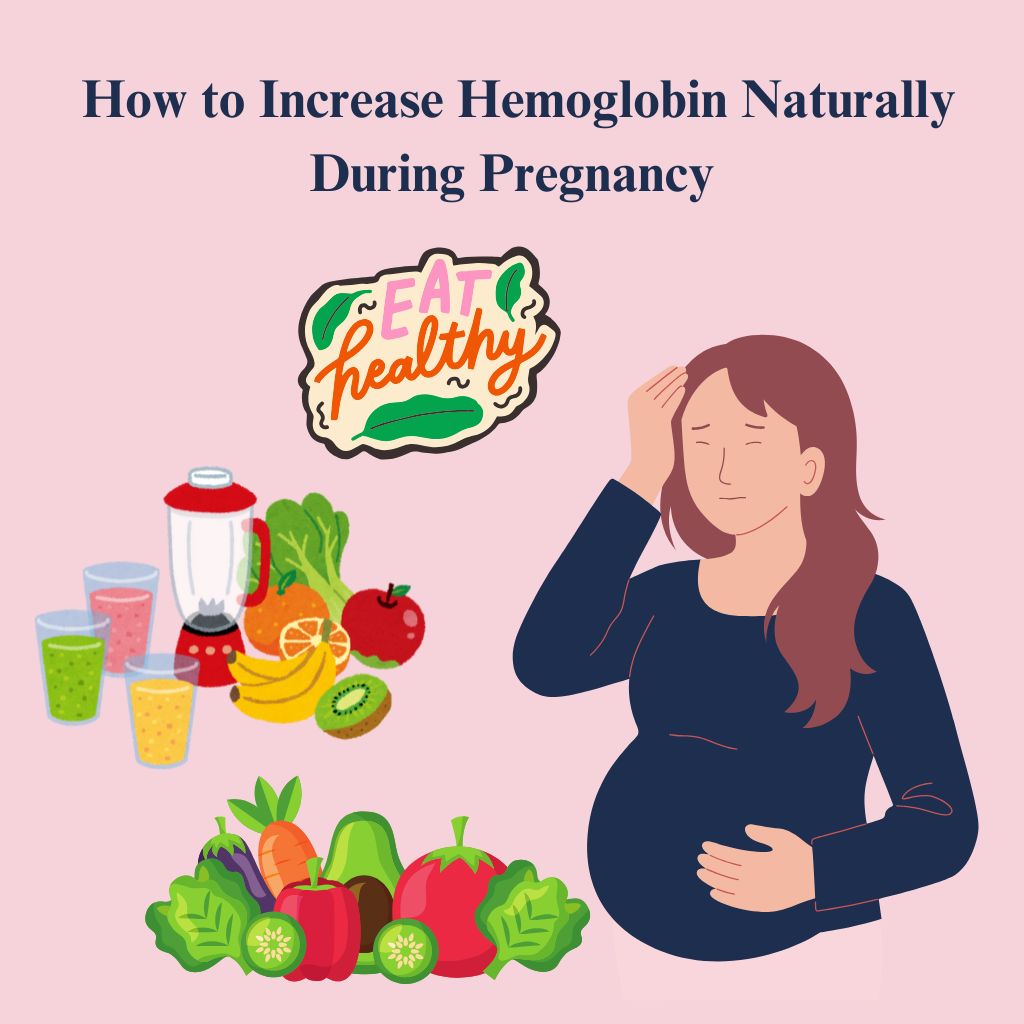
Maintaining healthy hemoglobin levels is essential during pregnancy, as it ensures that both the mother and baby receive enough oxygen. One of the most effective ways to achieve this is through diet. Choosing the right foods can support red blood cell production and improve overall well-being.
The Role of Diet in Boosting Hemoglobin
What you eat directly affects hemoglobin levels. Including iron-rich foods in daily meals is key to how to increase hemoglobin during pregnancy naturally. However, iron is absorbed differently depending on its source, and some foods can either enhance or hinder this process.
Best Iron-Rich Foods for Pregnant Women
Iron is available in two forms: heme iron, which is found in animal-based foods, and non-heme iron, which comes from plant sources. The body absorbs heme iron more efficiently, but non-heme iron can still contribute significantly to daily iron intake when paired with the right nutrients.
Animal Sources:
- Lean red meat (beef, lamb)
- Chicken
- Fish (such as salmon and tuna)
- Eggs
Plant-Based Sources:
- Spinach and other leafy greens
- Lentils and beans
- Tofu
- Beetroot
- Nuts and seeds (pumpkin seeds, almonds, sesame seeds)
Foods That Help Iron Absorption
Iron alone is not enough; the body needs Vitamin C to absorb it effectively. Pairing iron-rich foods with Vitamin C-rich options can maximize the benefits.
Good sources of Vitamin C include:
- Citrus fruits (oranges, lemons, grapefruits)
- Tomatoes
- Bell peppers
- Strawberries
For example, adding lemon juice to spinach or eating an orange after a meal rich in iron can significantly improve absorption.
Foods to Avoid That Hinder Iron Absorption
Certain foods can block iron absorption and should be consumed in moderation, especially around meal times:
- Tea and coffee: Tannins in tea and caffeine in coffee reduce iron absorption.
- Calcium-rich foods: Dairy products (milk, cheese, yogurt) can interfere with iron uptake when consumed together with iron-rich foods.
- Processed foods: High in additives and low in essential nutrients, processed foods may not support optimal hemoglobin production.
How to Increase Hemoglobin in Pregnancy by Food
A well-balanced diet that includes both iron-rich foods and Vitamin C can significantly improve hemoglobin levels. Meal planning, mindful eating, and making small but effective dietary changes can ensure a steady supply of iron for a healthy pregnancy.
Meal Plan to Increase Hemoglobin During Pregnancy
Eating a variety of iron-rich foods throughout the day can help boost hemoglobin levels effectively. Below is a balanced meal plan that combines iron-rich foods, Vitamin C sources, and essential nutrients needed for healthy blood production.
Breakfast:
- Scrambled eggs with spinach and whole-grain toast
- A glass of fresh orange juice (Vitamin C helps absorb iron from spinach)
- A handful of almonds and walnuts
Mid-Morning Snack:
- A bowl of Greek yogurt with strawberries and chia seeds
- A handful of pumpkin seeds (rich in iron and zinc)
Lunch:
- Grilled chicken or paneer with quinoa and sautéed bell peppers
- Lentil soup (dal) with a squeeze of lemon
- Beetroot and carrot salad with olive oil dressing
Afternoon Snack:
- Hummus with whole wheat crackers or vegetable sticks (carrots, cucumbers, bell peppers)
- A glass of fresh pomegranate juice
Dinner:
- Grilled salmon or tofu with a side of steamed broccoli and brown rice
- Spinach and chickpea curry with whole wheat chapati
- A bowl of mixed fruit (papaya, guava, kiwi – all high in Vitamin C)
Before Bed (If Needed):
- Warm almond milk with a pinch of turmeric
- A handful of dried apricots or figs (natural sources of iron)
Additional Tips:
- Cook with cast iron cookware This can increase the iron content of your meals.
- Avoid tea or coffee immediately after meals, as they can block iron absorption.
- Stay hydrated: as proper hydration supports red blood cell production.
This meal plan provides a mix of heme and non-heme iron sources, ensuring optimal hemoglobin levels.
Supplements & Medical Treatments for Low Hemoglobin
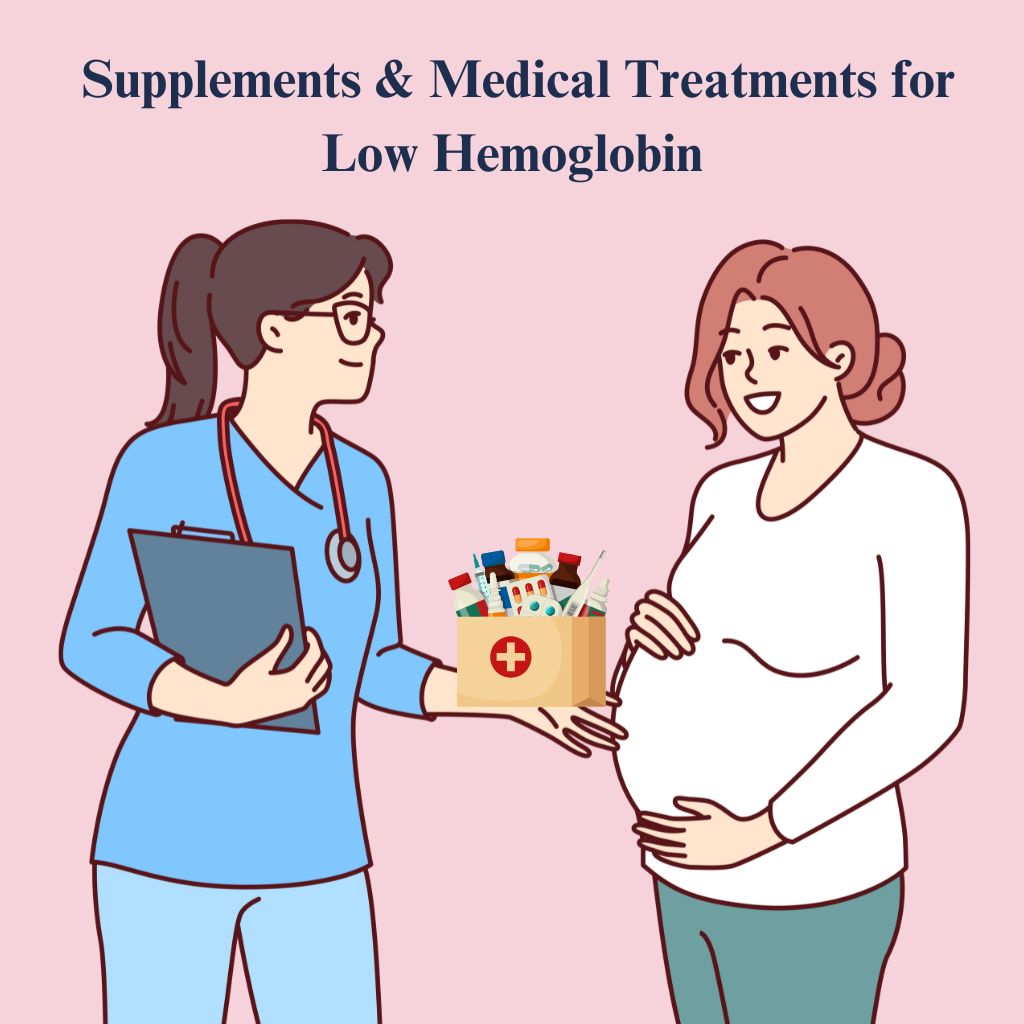
Diet alone may not always be enough to maintain healthy hemoglobin levels during pregnancy. In cases where levels drop too low, supplements and medical treatments become necessary to prevent complications.
When Do You Need Iron Supplements?
Doctors usually recommend iron supplements when dietary intake is insufficient or when a pregnant woman is diagnosed with anemia. The need for supplements depends on how to improve hemoglobin levels efficiently while ensuring both the mother and baby receive adequate oxygen supply.
Common indicators that iron supplements may be required:
- Hemoglobin levels falling below 11 g/dL in the first or third trimester.
- Fatigue, dizziness, or frequent shortness of breath.
- A doctor’s diagnosis confirming iron-deficiency anemia.
Types of Iron Supplements Recommended During Pregnancy
Iron is available in different forms, and the right choice depends on individual needs. Some of the commonly recommended options include:
- Ferrous sulfate: One of the most prescribed forms due to its high iron content.
- Ferrous gluconate: A milder option with fewer digestive side effects.
- Ferrous fumarate: Offers a higher concentration of elemental iron.
Taking these supplements with Vitamin C-rich foods can help improve absorption and support how to increase hb level during pregnancy naturally.
Iron Infusion for Severe Anemia: When is it Necessary?
In cases where hemoglobin levels drop significantly, oral supplements may not be effective enough. An iron infusion may be required for:
- Severe anemia (Hb below 8 g/dL)
- Inability to tolerate oral iron due to digestive side effects
- Conditions that limit iron absorption, such as gastrointestinal disorders
Iron infusions are administered under medical supervision and help how to increase hemoglobin level quickly in critical situations.
Side Effects of Iron Supplements & How to Manage Them
While iron supplements are beneficial, some women may experience:
- Nausea or constipation
- Dark-colored stools
- Stomach discomfort
To reduce side effects:
- Take iron with food or as directed by a doctor.
- Drink plenty of water and eat fiber-rich foods to avoid constipation.
- Avoid consuming calcium-rich foods at the same time as iron supplements.
If symptoms persist, a doctor may suggest alternative formulations or an adjusted dosage.
Natural Iron Supplement Alternatives
For those who experience side effects from traditional iron supplements or prefer natural sources, several food-based alternatives can help maintain healthy hemoglobin levels during pregnancy. These options provide bioavailable iron while being gentle on digestion.
Iron-Rich Herbal Remedies & Whole Foods
- Blackstrap Molasses: A natural iron powerhouse with added benefits of calcium and magnesium.
- Moringa Leaves: High in iron, Vitamin C, and folate, making it an excellent choice for boosting hemoglobin naturally.
- Beetroot Juice: Helps improve red blood cell production and supports blood circulation.
- Dates & Figs: Naturally rich in iron and fiber, aiding digestion while increasing iron intake.
- Pumpkin Seeds & Sunflower Seeds: Provide plant-based iron along with zinc and magnesium.
- Dried Apricots & Raisins: A convenient iron source with a good balance of Vitamin C to improve absorption.
- Nettle Tea: A traditional herbal tea known for its iron-boosting properties.
- Sesame Seeds (Til): Commonly used in traditional remedies to improve iron levels.
- Spinach & Fenugreek Leaves: Leafy greens with high iron content, especially effective when paired with citrus fruits.
- Pomegranate Juice: Supports blood production and is rich in iron, folate, and Vitamin C.
How to Incorporate These Into Your Diet
- Blend moringa powder into smoothies or sprinkle over salads.
- Drink beetroot and pomegranate juice regularly.
- Snack on a mix of dates, figs, and nuts for an iron-rich boost.
- Include blackstrap molasses in warm water or herbal teas.
Using these natural iron supplements alongside a balanced diet can be an effective way to support how to increase hemoglobin level quickly without relying solely on synthetic supplements.
Lifestyle Changes to Maintain Healthy Hemoglobin Levels
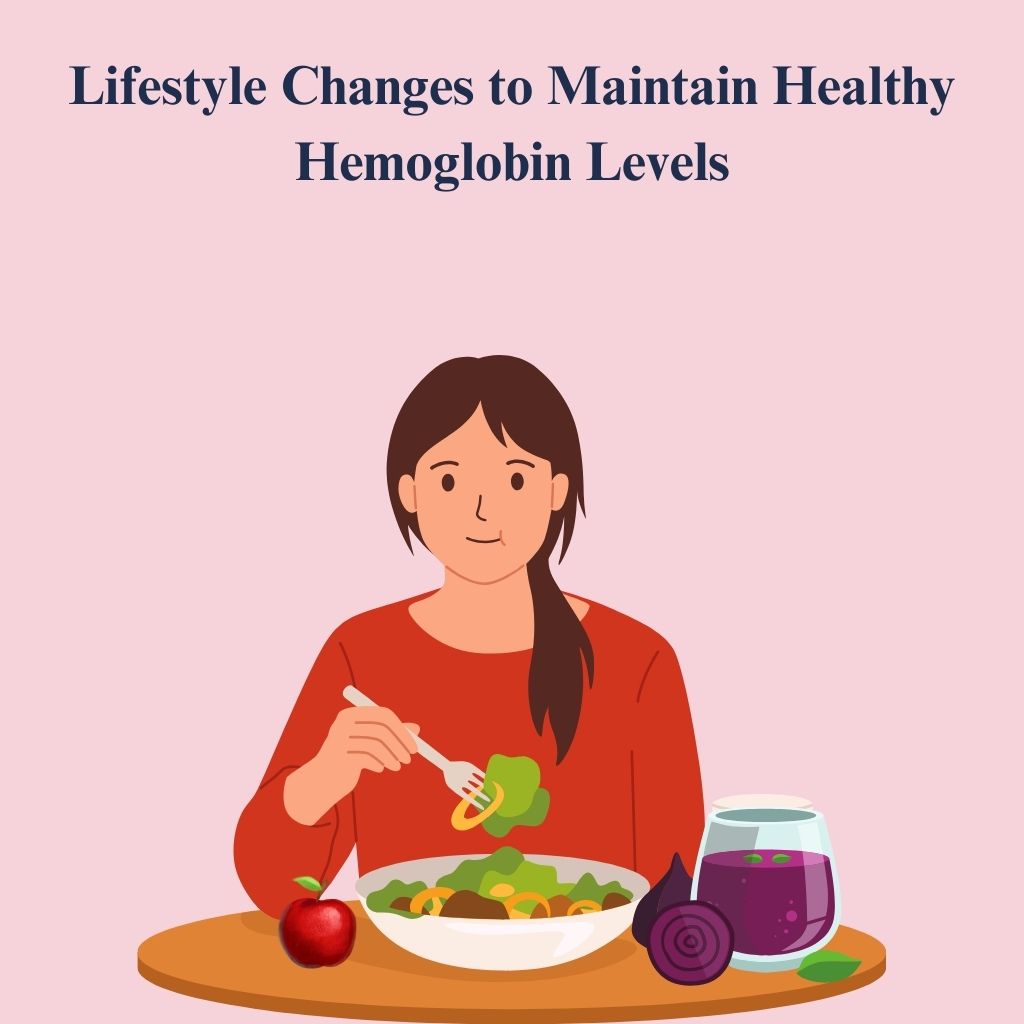
Maintaining hemoglobin levels during pregnancy is not just about diet and supplements. Lifestyle factors such as hydration, physical activity, and stress management also play a crucial role. Simple daily habits can significantly support red blood cell production and oxygen circulation in the body.
Hydration & Blood Circulation: Why Drinking Enough Water Matters
Water is essential for how to increase blood in body during pregnancy, as it helps transport nutrients, oxygen, and iron to the cells. Pregnant women require more fluids to support increased blood volume and prevent dehydration, which can impact hemoglobin levels.
- Aim for 8–10 glasses of water daily to keep blood circulation optimal.
- Include coconut water and fresh fruit juices for added electrolytes.
- Limit caffeinated drinks, as they may interfere with iron absorption.
The Role of Moderate Physical Activity in Maintaining Iron Levels
Engaging in gentle exercises improves circulation, ensuring better oxygen delivery to cells. Moderate movement can also help in how to increase blood during pregnancy naturally by stimulating red blood cell production.
Recommended activities:
- Prenatal yoga: Enhances blood flow and supports relaxation.
- Walking: A simple and safe way to keep circulation active.
- Light stretching: Prevents fatigue and supports overall well-being.
Avoid overexertion and always consult a doctor before starting any new exercise routine.
Managing Stress & Its Impact on Iron Absorption
Chronic stress can affect digestion and iron absorption, leading to lower hemoglobin levels. Stress hormones interfere with the body’s ability to utilize essential nutrients efficiently. To support how to improve hemoglobin naturally, consider:
- Breathing exercises to regulate stress responses.
- Meditation and mindfulness techniques to maintain emotional balance.
- Adequate sleep to support recovery and hormone regulation.
By making these small but significant lifestyle adjustments, pregnant women can promote healthy blood circulation and hemoglobin levels naturally.
Weekly Diet Plan to Increase Hemoglobin During Pregnancy

A well-balanced diet plays a crucial role in boosting hemoglobin levels. By including iron-rich foods and pairing them with essential nutrients like Vitamin C and folate, pregnant women can improve iron absorption naturally.
This 7-day meal plan is designed to help how to increase hemoglobin in a week during pregnancy and provide sustained energy throughout the day.
7-Day Iron-Rich Meal Plan
Day 1
Breakfast: Scrambled eggs with spinach and whole wheat toast + a glass of fresh orange juice
Lunch: Lentil soup with brown rice + beetroot and carrot salad
Dinner: Grilled salmon with steamed broccoli + whole wheat roti
Day 2
Breakfast: Oats with dates, almonds, and sesame seeds + a handful of walnuts
Lunch: Chickpea curry with quinoa + cucumber and tomato salad with lemon dressing
Dinner: Tofu stir-fry with bell peppers and cashews + whole wheat roti
Day 3
Breakfast: Whole grain pancakes with honey + pomegranate juice
Lunch: Grilled chicken with sautéed kale + baked sweet potato
Dinner: Moong dal khichdi with a side of stir-fried green beans
Day 4
Breakfast: Greek yogurt with flaxseeds, figs, and chia seeds
Lunch: Rajma (kidney beans) with brown rice + lemon juice dressing
Dinner: Grilled paneer with sautéed mushrooms and bell peppers
Day 5
Breakfast: Sprouts and avocado toast + fresh guava slices
Lunch: Palak paneer with jowar roti + a bowl of mixed fruit
Dinner: Baked fish with quinoa and roasted carrots
Day 6
Breakfast: Smoothie with banana, moringa powder, and almond milk
Lunch: Dal with red rice + sautéed green peas and bell peppers
Dinner: Stuffed capsicum with lentils and paneer
Day 7
Breakfast: Millet porridge with jaggery and sesame seeds
Lunch: Vegetable soup with whole wheat chapati
Dinner: Grilled tofu with quinoa and steamed broccoli
Combining Nutrients for Better Absorption
- Iron + Vitamin C: Adding lemon juice to salads or having citrus fruits with meals enhances iron absorption.
- Folate-rich foods: Leafy greens, lentils, and beets help prevent anemia.
- Healthy fats: Nuts, seeds, and avocados support nutrient absorption.
Tips for Vegetarian & Vegan Pregnant Women
- Choose plant-based iron sources like beans, lentils, tofu, and spinach.
- Pair with Vitamin C-rich foods (citrus fruits, bell peppers) for better absorption.
- Include fortified foods like iron-enriched cereals and plant-based milk.
For those wondering how can I increase my hemoglobin in 24 hours, quick fixes include:
- Drinking beetroot and pomegranate juice
- Having dates, figs, and almonds
- Adding moringa powder to meals
For women managing diabetes, how to increase haemoglobin in diabetic patients requires balancing iron intake with low-GI foods like lentils, quinoa, and whole grains while avoiding sugar-heavy sources like jaggery.
When to See a Doctor?
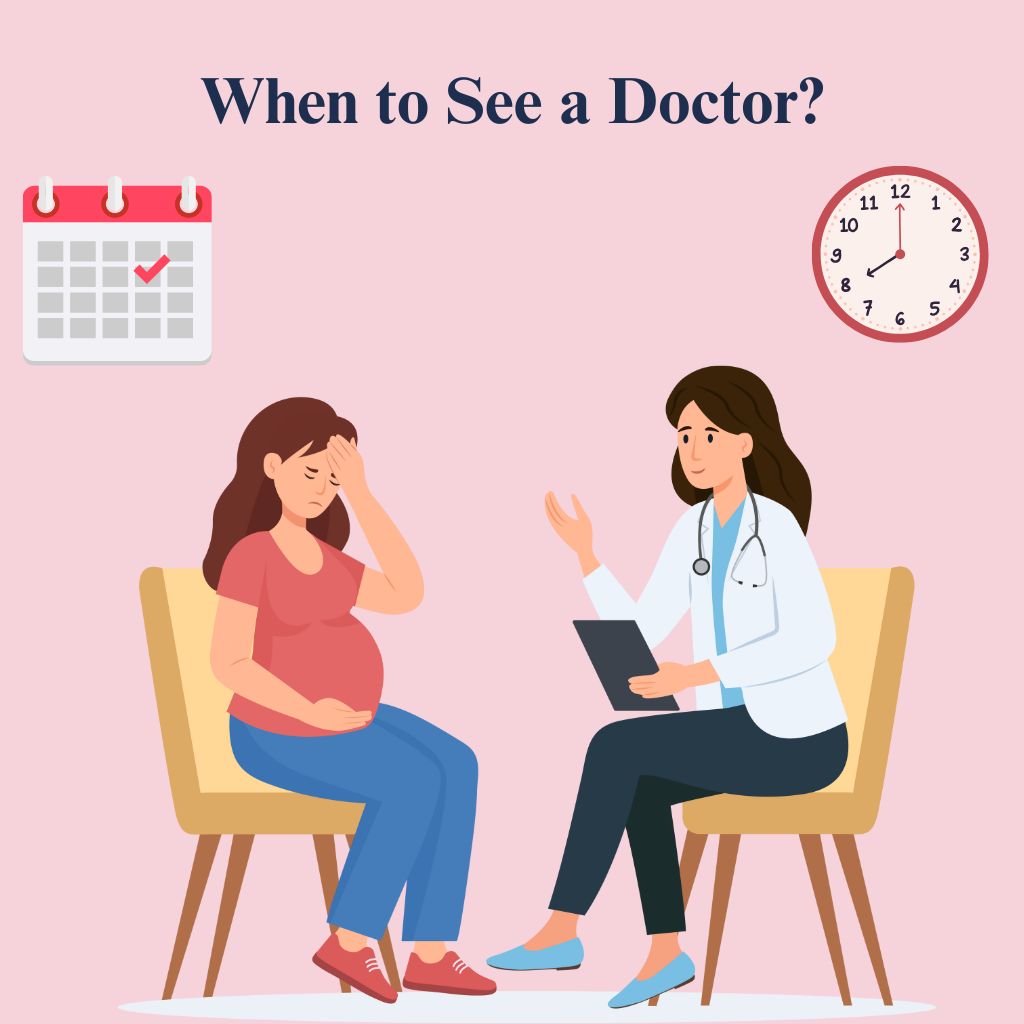
While mild fluctuations in haemoglobin level for pregnant ladies are common, dangerously low levels can pose risks for both the mother and baby. Recognizing warning signs early and seeking medical advice can prevent complications.
Warning Signs of Dangerously Low Hemoglobin Levels
If hemoglobin drops significantly, the body may struggle to deliver enough oxygen. Some signs that indicate an urgent need for medical attention include:
- Extreme fatigue and weakness that doesn’t improve with rest
- Dizziness or fainting spells
- Rapid heartbeat or shortness of breath
- Severe paleness, brittle nails, or cracked lips
- Unexplained chest pain or irregular heartbeat
Any of these symptoms, especially in combination, may indicate severe anemia or an underlying health condition.
Blood Tests & Monitoring Hemoglobin Levels
Regular blood tests help track what should be hemoglobin level during pregnancy. Medical professionals typically recommend:
- Complete Blood Count (CBC): Measures hemoglobin, hematocrit, and red blood cell levels.
- Serum Ferritin Test: Checks the body’s iron stores to determine deficiency.
- Reticulocyte Count: Evaluates new red blood cell production.
Doctors generally check hemoglobin levels at the beginning of pregnancy and again in the second and third trimesters. If levels drop below 11 g/dL in the first or third trimester or 10.5 g/dL in the second trimester, additional tests and treatment may be necessary.
Medical Conditions That Require Immediate Attention
Some conditions demand close monitoring and treatment to how to treat anemia in pregnancy effectively:
- Severe Iron-Deficiency Anemia: May require iron infusion or injections if oral supplements are ineffective.
- Folate-Deficiency Anemia: Requires folic acid supplements to support red blood cell production.
- Hemolytic Anemia: A rare condition where red blood cells break down faster than they are produced.
- Thalassemia: A genetic disorder affecting hemoglobin production.
Seeking timely medical care and following prescribed treatments can prevent complications and support a healthy pregnancy.
FAQs
Q1: What should a pregnant woman eat to increase hemoglobin?
Ans: A balanced diet rich in iron, Vitamin C, and folate can help increase hemoglobin during pregnancy. Foods like lean meat, lentils, spinach, beetroot, pomegranate, and fortified cereals are excellent choices. Pairing iron-rich foods with citrus fruits (oranges, lemons) enhances absorption.
Q2: What is the fastest way to increase hemoglobin?
Ans: For a quick boost, consuming iron-rich foods with Vitamin C, taking doctor-prescribed iron supplements, and staying hydrated can help. In severe cases, iron infusions may be recommended to restore levels rapidly.
Q3: Can low hemoglobin affect the baby?
Ans: Yes. If normal hemoglobin level in pregnancy is not maintained, it can lead to preterm birth, low birth weight, and developmental delays. Severe anemia increases the risk of complications during delivery.
Q4: How much iron is needed daily during pregnancy?
Ans: Pregnant women require 27 mg of iron daily, as recommended by health organizations. This amount supports increased blood volume and fetal growth.
Q5: What are the best home remedies for increasing hemoglobin?
Ans: Including beetroot juice, dates, blackstrap molasses, and moringa leaves in daily meals helps how to improve hemoglobin naturally. Cooking in iron cookware can also enhance iron intake.
Q6: What is the normal hemoglobin level in pregnancy?
Ans: Doctors recommend maintaining hemoglobin levels between 11-14 g/dL during pregnancy. Anything below 11 g/dL may require dietary changes or supplements.
Q7: Can too much iron be harmful during pregnancy?
Ans: Yes. Excess iron can cause constipation, nausea, and even toxicity in rare cases. Always follow a doctor’s recommendation when taking supplements.
Q8: How long does it take to increase hemoglobin?
Ans: With consistent diet changes and supplementation, hemoglobin levels may improve within 3-4 weeks. Severe deficiencies may take longer to correct.
Q9: Are there natural alternatives to iron supplements?
Ans: Yes. Nettle tea, blackstrap molasses, sesame seeds, pumpkin seeds, and dried fruits provide plant-based iron that can be easily absorbed with Vitamin C-rich foods.
Q10: Is anemia common in pregnancy?
Ans: Yes. Many women experience mild anemia due to increased blood volume. However, monitoring hemoglobin levels and maintaining a nutrient-rich diet can prevent complications.
Conclusion
Maintaining healthy hemoglobin levels during pregnancy is essential for both maternal and fetal well-being. A balanced diet rich in iron, Vitamin C, and folate, along with lifestyle changes and supplements when necessary, can help prevent anemia and promote a healthy pregnancy.
For most pregnant women, incorporating iron-rich foods like spinach, lentils, eggs, and fortified cereals can significantly improve hemoglobin levels. Pairing these with Vitamin C sources ensures better absorption. In cases of severe deficiency, a doctor may recommend iron supplements or medical interventions to restore normal levels.
Regular health check-ups play a vital role in tracking hemoglobin levels and preventing complications. If symptoms such as extreme fatigue, dizziness, or shortness of breath persist, it is essential to seek medical attention.
Consulting a women care clinic in Mumbai can help diagnose and treat anemia effectively, ensuring the best outcomes for both mother and baby.
For those looking for expert maternity care, choosing the best maternity hospital in Mumbai can provide comprehensive prenatal care, regular screenings, and tailored treatment plans.
If you’re experiencing symptoms of low hemoglobin or have concerns about iron levels during pregnancy, schedule a consultation with a healthcare provider for personalized guidance. Taking early action can make a significant difference in ensuring a safe and healthy pregnancy.


